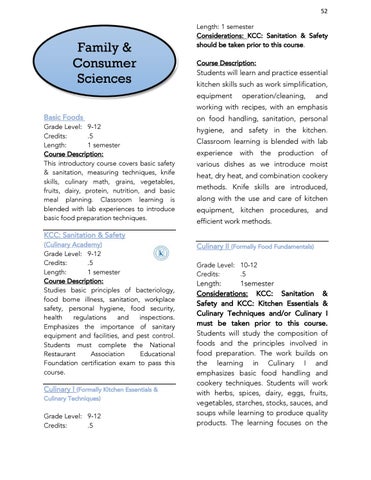52
Family & Consumer Sciences
Length: 1 semester Considerations: KCC: Sanitation & Safety should be taken prior to this course. Course Description:
Students will learn and practice essential kitchen skills such as work simplification, equipment
operation/cleaning,
and
working with recipes, with an emphasis Basic Foods Grade Level: 9-12 Credits: .5 Length: 1 semester Course Description: This introductory course covers basic safety & sanitation, measuring techniques, knife skills, culinary math, grains, vegetables, fruits, dairy, protein, nutrition, and basic meal planning. Classroom learning is blended with lab experiences to introduce basic food preparation techniques.
on food handling, sanitation, personal hygiene, and safety in the kitchen. Classroom learning is blended with lab experience
with the
production
of
various dishes as we introduce moist heat, dry heat, and combination cookery methods. Knife skills are introduced, along with the use and care of kitchen equipment, kitchen procedures, and efficient work methods.
KCC: Sanitation & Safety (Culinary Academy) Grade Level: 9-12 Credits: .5 Length: 1 semester Course Description: Studies basic principles of bacteriology, food borne illness, sanitation, workplace safety, personal hygiene, food security, health regulations and inspections. Emphasizes the importance of sanitary equipment and facilities, and pest control. Students must complete the National Restaurant Association Educational Foundation certification exam to pass this course.
Culinary I (Formally Kitchen Essentials & Culinary Techniques)
Grade Level: 9-12 Credits: .5
Culinary II (Formally Food Fundamentals) Grade Level: 10-12 Credits: .5
Length: 1semester Considerations: KCC: Sanitation & Safety and KCC: Kitchen Essentials & Culinary Techniques and/or Culinary I must be taken prior to this course. Students will study the composition of foods and the principles involved in food preparation. The work builds on the learning in Culinary I and emphasizes basic food handling and cookery techniques. Students will work with herbs, spices, dairy, eggs, fruits, vegetables, starches, stocks, sauces, and soups while learning to produce quality products. The learning focuses on the







